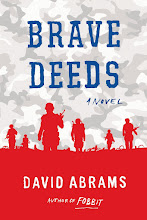On today’s menu:
 |
| photo by George R. Janecek |
The Utah contingent sat near the front of the ballroom, feeling cool by association. In a few minutes Larry was going to peel the fleur-de-lis off the wallpaper with his poetry, and with the misguided smugness of grad students, we considered him ours.
Except then it was fifteen minutes after the scheduled time of the reading, and there was no sign of Larry. This did not surprise us. He’d be there, we assured each other; time wasn’t really his best thing. But then another fifteen minutes went by.
We looked around the room nervously. Nobody seemed to want to go to the podium and call the reading off.
Just when the din of chatter seemed to have reached maximum volume, the doors to the ballroom crashed open and Larry stepped in. As distinctive as everything else about him, his walk was a little like a cartoon dog’s—think Pluto, or Marmaduke—he took big strides during which his feet never seemed to quite touch the ground. He float-loped to the podium in this fashion, and everyone fell quiet. He was wearing his uniform of a black motorcycle jacket, black jeans, and boots. He tucked the half cigarette he’d been holding behind his ear and looked down at his hands, as if a book might appear there. He felt around in all of his pockets, and came away with nothing.
In the second row we stole glances at each other. No one in the room seemed to be breathing. Then he put one hand on either side of the podium, bore down on us, and recited Caravaggio: Swirl and Vortex—all 4 glorious long-lined pages of it-- from memory. The room burst into applause. Our little cadre of grad students swooned. It was one of those moments—there are a few in every young writer’s life—that let you see exactly what you have signed up for.
2. The three finalists for The Story Prize were announced earlier this month: There’s Something I Want You to Do by Charles Baxter, Fortune Smiles by Adam Johnson, and Thirteen Ways of Looking by Colum McCann. The winner will be announced on March 2.
3. At the Time Now blog, Peter Molin appears to have loved Andria Williams’ debut novel, The Longest Night, as much as I did:
Williams notices what her characters notice, but also much that they don’t understand or only half-intuit; this close attention to their interiority as much as the period detail makes The Longest Night come alive. In many ways, though, the strictures of military service and culture portrayed in The Longest Night might be said to be timeless, for Williams casts a net around military families and military duty and pulls in many fine fish in the way of still relevant insights about life in uniform. Readers who never served or veterans who served only a tour or two can make of Williams’ portrait of military domesticity what they will, but readers who have tried to keep a marriage together over the long haul of a military career will marvel at her acuity at describing the rewards and pleasures, such as they are, while also conveying a more pervasive feeling of disappointment and perhaps even of life wasted.
4. File under: In Search of Lost Reading Time.
While in college, I promised myself that one day I would read the entirety of In Search of Lost Time after graduation. I made this vow, as all 21-year-olds must, knowing very little of the realities of full-time employment, commuting, and Sunday brunch plans. I also made this resolution at a time when my daily Internet activity consisted of checking my email and maybe, if I was really hungry, the dining hall menu. I had no idea that reading would one day become an activity that I would have to plan....And so, here I am, 10 years (!) later, trying again to finish one of the best novels I’ve ever read, possibly the best novel I’ve ever read. (I’ll know for sure when I finish.) The world (i.e. the Internet) has only gotten more distracting and, having become the mother of a three-year-old, my daily responsibilities have increased and become less negotiable. At the same time, one thing I’ve learned over the past decade is that you can accomplish a lot by doing a little of something every day. You can raise a child, write a book, make a life with another person. Almost everyone I know who has completed In Search of Lost Time (and to be clear, most of these “known” people are those who have written about the experience, not anyone I’ve met personally) did it slowly, reading just 10 to 20 pages a day, usually in the morning. At a pace of 10 pages a day, it will take me about a year and two months to finish, a period of time that doesn’t seem as long as it did 10 years ago.Over at The Millions, staff writer Hannah Gersen is knuckling down, buckling up and saying “To hell with the distracting internet!” as she embarks on a plan to read Proust. Will you join her journey? I see you’ve bought a box of madeleines, so you’re already halfway there.
5. The 49 Writers Center in Alaska always has a good lineup of classes, but if you can't afford to travel all the way to Anchorage, I have good news for you: you can get your schooling from the comfort of your lawn chair in Boca Raton. The Center has a series of online courses, including one on flash fiction taught by Katey Schultz (Flashes of War). Here are the details:
This four-week online course will focus on flash fiction—short stories that range from 250-750 words—often described as “stories of the moment” or “a work of art carved on a grain of sand.” Writers who are unfamiliar with the genre will find enough challenge and support to come away with new knowledge and guided practice, as well as a very clear understanding of scene. More experienced writers will enjoy the intellectual challenges of the lectures and discussions, as well as in-depth prompts from the instructor. Each week includes guided discussion forums, assigned readings, a brief lecture, and prompts. Participants should plan on 2-3 hours of work with the materials per week (or more depending on personal engagement), in addition to writing time. At the end of the month, turn in 1 polished flash fiction to the instructor for feedback (and participate in the optional peer-review process, if desired). The course concludes with an optional livestream Video Chat.The first class bell rings on Feb. 29. Go here to see the syllabus.















No comments:
Post a Comment